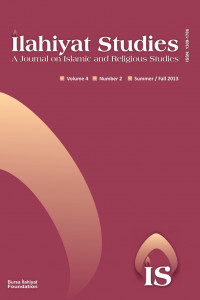Öz
Both supporters and opponents of the headscarf ban in Turkey refer to the freedom of the individual. This case makes it necessary to address the headscarf problem in the context of discussions on freedom. This study aims to evaluate the headscarf problem in the context of two approaches that we call “the enlightened perspective” and “the liberal perspective.” The enlightened perspective supports the headscarf ban in Turkey and is based on a particular interpretation of the idea of positive liberty. According to this interpretation, freedom means the manifestation of the rational self. Hence, people’s freedom is connected with the sovereignty of their true lifestyle. Because religion equals “the irrational,” the religious lifestyle is a deviation from the true way of life. For that reason, the use of the headscarf, which is a sign of a religious lifestyle, in the public sphere is seen as a threat to the correct lifestyle. The liberal perspective addresses the demand for the abolition of the headscarf ban in the context of the individual’s freedom of belief. In this sense, it is possible to say that behind the liberal perspective’s assessments about the headscarf issue lies the idea of negative liberty. Negative liberty means the lack of any outer intervention or pressure that limits the individual’s choices and actions. The headscarf ban is a restriction for a woman who chooses a life in accordance with Islamic values and sees covering her body as a necessity for such a lifestyle. According to the liberal perspective, wearing the headscarf must be seen as a lifestyle choice and thus respected. Allowing this choice is a requirement for freedom.
Kaynakça
- Berlin, Isaiah, “Introduction,” Four Essays on Liberty (Oxford & New York: Oxford University Press, 1996), i-lxiii.
- Berlin, Isaiah, “İki Özgürlük Kavramı [= Two Concepts of Liberty],” (translated into Turkish by Mehmet Saygılı and Enis Oktay), Cogito 32 (2002), 202-253.
- Carter, Ian, “Positive and Negative Liberty,” The Stanford Encyclopedia of Philosophy (Spring 2012 Edition), Edward N. Zalta (ed.), http://plato.stanford.edu/archives/spr2012/entries/liberty-positive-negative
- Erdoğan, Mustafa, Aydınlanma, Modernlik ve Liberalizm (Ankara: Orion Press, 2006).
- Hayek, Friedrich August von, “Freedom, Reason and Tradition,” Ethics: An International Journal of Social Political and Legal Philosophy 68/4 (1958), 229-245.
- Honneth, Axel, “Negative Freedom and Cultural Belonging: Unhealthy Tension in Political Philosophy of Isaiah Berlin,” Social Research 66/4 (1999), 1063-1077.
- Kılıçbay, Mehmet Ali, “Atatürkçülük ya da Türk Aydınlanması,” in Ali Yaşar Sarıbay and Ersin Kalaycıoğlu (eds.), Türkiye’de Politik Değişim ve Modernleşme (Bursa: Dora Press, 2009), 233-242.
- McBride, William L., “The Concept of Liberty Thirty Years Later: A Sartre-Inspired Critique,” Social Theory and Practice 16/3 (1990), 297-322. https://doi.org/10.5840/soctheorpract199016315
- Pettit, Philip, Cumhuriyetçilik: Bir Özgürlük ve Yönetim Teorisi [=Republicanism: A Theory of Freedom and Government] (translated into Turkish by Abdullah Yılmaz; Istanbul: Ayrıntı Yayınları, 1998).
- Sarıbay, Ali Yaşar, Demokrasinin Sosyolojisi (Istanbul: Timaş Yayınları, 2012).
- Schmidt, Karl, “Freedom and Democracy,” The Journal of Philosophy 39/14 (1942), 365-381. https://doi.org/10.2307/2018624
- Taylor, Charles, “Negatif Özgürlük Anlayışının Yanılgısı [= What’s Wrong with Negative Liberty],” (translated into Turkish by Özden Arıkan), Cogito 32 (2002), 254-275.
- Tunçay, Mete (2001), “İkna (İnandırma) yerine Tecebbür (Zorlama),” in Tanıl Bora and Murat Gültekingil (eds.), Modern Türkiye’de Siyasî Düşünce, Cilt 2: Kemalizm (Istanbul: İletişim Yayınları, 2001), 92-96.
- White, Richard J., Nietzsche and the Problem of Sovereignty (Urbana, IL: The University of Illinois Press, 1997).
- Yayla, Atilla, “Ahlak, Hukuk ve Başörtüsü Yasağı,” www.liberal-dt.org.tr
Öz
Anahtar Kelimeler
Negative liberty positive liberty freedom lifestyle headscarf problem liberal perspective enlightened perspective public sphere
Kaynakça
- Berlin, Isaiah, “Introduction,” Four Essays on Liberty (Oxford & New York: Oxford University Press, 1996), i-lxiii.
- Berlin, Isaiah, “İki Özgürlük Kavramı [= Two Concepts of Liberty],” (translated into Turkish by Mehmet Saygılı and Enis Oktay), Cogito 32 (2002), 202-253.
- Carter, Ian, “Positive and Negative Liberty,” The Stanford Encyclopedia of Philosophy (Spring 2012 Edition), Edward N. Zalta (ed.), http://plato.stanford.edu/archives/spr2012/entries/liberty-positive-negative
- Erdoğan, Mustafa, Aydınlanma, Modernlik ve Liberalizm (Ankara: Orion Press, 2006).
- Hayek, Friedrich August von, “Freedom, Reason and Tradition,” Ethics: An International Journal of Social Political and Legal Philosophy 68/4 (1958), 229-245.
- Honneth, Axel, “Negative Freedom and Cultural Belonging: Unhealthy Tension in Political Philosophy of Isaiah Berlin,” Social Research 66/4 (1999), 1063-1077.
- Kılıçbay, Mehmet Ali, “Atatürkçülük ya da Türk Aydınlanması,” in Ali Yaşar Sarıbay and Ersin Kalaycıoğlu (eds.), Türkiye’de Politik Değişim ve Modernleşme (Bursa: Dora Press, 2009), 233-242.
- McBride, William L., “The Concept of Liberty Thirty Years Later: A Sartre-Inspired Critique,” Social Theory and Practice 16/3 (1990), 297-322. https://doi.org/10.5840/soctheorpract199016315
- Pettit, Philip, Cumhuriyetçilik: Bir Özgürlük ve Yönetim Teorisi [=Republicanism: A Theory of Freedom and Government] (translated into Turkish by Abdullah Yılmaz; Istanbul: Ayrıntı Yayınları, 1998).
- Sarıbay, Ali Yaşar, Demokrasinin Sosyolojisi (Istanbul: Timaş Yayınları, 2012).
- Schmidt, Karl, “Freedom and Democracy,” The Journal of Philosophy 39/14 (1942), 365-381. https://doi.org/10.2307/2018624
- Taylor, Charles, “Negatif Özgürlük Anlayışının Yanılgısı [= What’s Wrong with Negative Liberty],” (translated into Turkish by Özden Arıkan), Cogito 32 (2002), 254-275.
- Tunçay, Mete (2001), “İkna (İnandırma) yerine Tecebbür (Zorlama),” in Tanıl Bora and Murat Gültekingil (eds.), Modern Türkiye’de Siyasî Düşünce, Cilt 2: Kemalizm (Istanbul: İletişim Yayınları, 2001), 92-96.
- White, Richard J., Nietzsche and the Problem of Sovereignty (Urbana, IL: The University of Illinois Press, 1997).
- Yayla, Atilla, “Ahlak, Hukuk ve Başörtüsü Yasağı,” www.liberal-dt.org.tr
Ayrıntılar
| Birincil Dil | İngilizce |
|---|---|
| Konular | Din Araştırmaları |
| Bölüm | Araştırma Makaleleri |
| Yazarlar | |
| Yayımlanma Tarihi | 12 Haziran 2014 |
| Gönderilme Tarihi | 17 Haziran 2013 |
| Yayımlandığı Sayı | Yıl 2013 Cilt: 4 Sayı: 2 |


